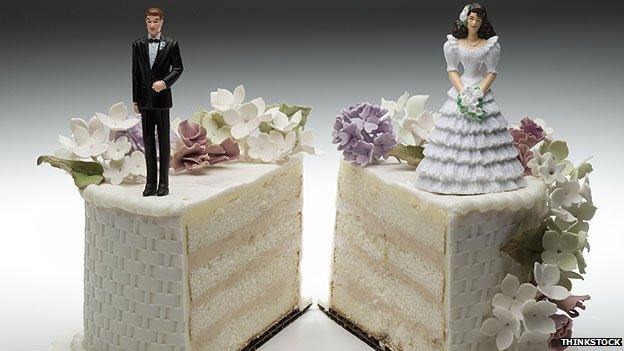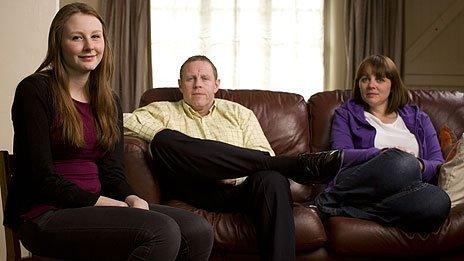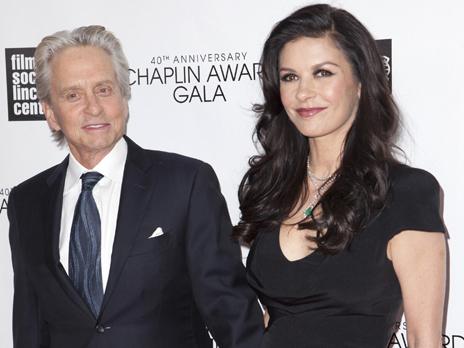Should you tell your child why you are splitting up?
- Published

Many marriages end in divorce, but if you have children should you explain to them the reasons why the marriage did not work?
"I'd like to know… I want to know if there's maybe another reason, an underlying problem or something," says 17-year-old Daisy Merriman.
Daisy's parents Claire and David separated two years ago and Daisy remembers the moment she was told the news.
"Mum called me downstairs and she sat me down in the living room and Dad had been crying and so had Mum," says Daisy, whose family appears in the film Mum and Dad are Splitting Up. "It must have been quite a big thing for Dad to be crying because he never cries about anything really.
"They both said that they'd been talking and they'd decided to do a trial separation. It was so much to take in at that point and I just ran up to my room and started crying."
At the time Daisy's mum Claire did not go into detail about the reasons why they decided to separate.
"I don't think 14-year-old children need to know the ins and outs," says Claire. "They know that their mum and dad aren't going to be together any more. That's hard to take at 14 or 20 or any age I should imagine.
"I know it's a bit of a line that sometimes you trot out to perhaps protect your children, that Mum and Dad don't get on any more and we love you but we can't stay together, and that is true, it doesn't matter what causes that to happen."
According to Claire, they decided to separate because of a build-up of arguing, not doing things together and spending quite a lot of time apart because David worked a lot - reasons David also agrees with.
"Neither of us could compromise enough to want to therefore then sort it out," says Claire.

Daisy says she had initially thought her parents could work through it
More than four million children now live in separated families, external, which equates to about a third of all children in the UK, but if young people would like to know the reasons why their parents cannot live together any more, should there be more openness?
Paula Hall is a psychotherapist who works with the relationship support organisation Relate and has written their guide, Help Your Children Cope with Your Divorce. She says it depends on the age of the child, the reasons for the break-up and their ability to understand it.
According to Hall, when a child or young person asks why their parents are separating, they are really asking: "Is there a way you can stay together?"
As parents, if you have decided the marriage is definitely over, you do not want to get into a debate about how to fix it, she suggests.
"Parents know their children best so it depends on the child obviously, but… potentially you're opening the door for lots of 'Why, why, why, why, why?' and setting a child up to be your marriage guidance counsellor," says Hall.
"Often it's about parents, we have made the decision, we have good reasons for this decision and the bottom line always is, Mummy and Daddy do not share the same expectations of a relationship, or we want different things from the relationship… and we have tried to negotiate it and we have tried to find the answers and we can't, and that's why we've decided to split up."
Hall says it can be very difficult to get into a conversation about why you are separating without placing blame on the other person and there are also clearly times when it would be completely inappropriate to discuss the reasons for a break-up with a child.
"Let's say you were living in a sexless relationship. Talking about your sex life to your seven-year-old and trying to explain why that's not OK for you is not going to be appropriate," says Hall.
Family counselling sessions are now widely available and it can sometimes be helpful for children and young people to have an independent, objective, third party to talk to.
Hall's advice to minimise the impact of divorce on children and young people is to have good contact arrangements and co-parenting communication and minimal conflict.

Michael Douglas and Catherine Zeta Jones, who recently announced their break-up, have two children
Although many young people do want to know the reasons why their parents are breaking up, child psychologist Laverne Antrobus who works at London's Tavistock Clinic says we have to be very careful about how open we are with them about the reasons behind a separation.
"We are talking about adult relationships, and depending on the age of your child, they are still learning about their own identity and particularly their own identity in relation to you as a parent," says Antrobus.
"So if you say something that sounds fairly innocent, for example, 'He or she doesn't make me happy any more,' that might seem very straightforward and obvious to you, but for a child they might start thinking, 'Well what happens when I don't make you happy, will you leave me?' So I think the words that we use are terribly important."
Antrobus says it is always better to talk about how things have developed between you.
"So as a couple you have decided you can't live together any more, but that as a parental couple it's really about… ensuring that children know that you will still have a connection to your care, love and commitment to them and I think that's so terribly containing."
She says it is important for a couple to explain to their children that while a part of the parents' relationship has come to an end, something else can continue to grow.
"Children are much more resilient than we think," says Antrobus, "but what needs to come quite quickly is that, 'We are your parents and that bond isn't going to break.'"
She says that although divorce and separation is an interruption in a child's life, the interruption will be more long-term if there is a lack of clarity about the separation - if, for instance, the couple still continue to live together. But it is also important not to blur the lines between parent and child.
"Psychologists have just been given a new directive which is that the age range that we work with used to be 0-18, now it's 0-25," says Antrobus.
"That is also an indication that we know much more about development and that children and young people are taking much more time to develop hormonally.
"We used to think things stopped a bit earlier but now we know that children's brain development is going on well into their early twenties.
"So if they're still trying to find their way in the world, we've got to be a bit careful about what we're saying to them, how adults manage themselves and how they behave. A sensitive response to a direct question I think is important, but I wouldn't get into adult territory with them."
The breakdown of a relationship does not have to mean the breakdown of a couple's parental relationship with their children.
"There are many families out there who manage to navigate this space quite well once they've got over that initial distressing period and can be at events together for their children," says Antrobus.
"It takes adults to really pull something out of themselves, to be bigger than the issues that they've faced in the past."
Mum and Dad are splitting up, featuring just the testimony of families, will be broadcast on Thursday 5 September at 21:00 BST on BBC Two. Or catch up later on BBC iPlayer.
You can follow the Magazine on Twitter, external and on Facebook, external
- Published6 August 2013
- Published20 December 2012